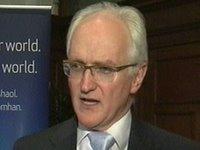Green Party: a crowd of flaky middle class dilettantes

The Green Party is different. It does not try to fool the electorate, as other parties do. It fools itself. They actually believe that the morsels they got in the revised programme for government was “transformational”, rather than just another piece of clever Fianna Fáil condescension. The delusional Greens believe they are principled green egalitarians, rather than the reality: they are a crowd of flaky middle-class dilettantes, amusing themselves with the fantasy of power and the delights of its trappings.
There was and is a central issue at the heart now of our politics: whether the fiscal crisis is to be resolved at the expense of those who can bear the expense or at the expense of those who can’t. In other words, whether the fiscal deficit to be addressed in the coming budget is to be addressed in the main by public expenditure cuts, including social welfare reductions, or addressed through the redistribution of wealth and income – ie through the tax system.
Predictably, there is silence on this central issue in this revised programme for government, a silence that is oh so eloquent. There will be some casual increases in taxation: water charges, a carbon tax and maybe some other charges. But the distribution of wealth and income will remain unchallenged and unaltered. The burden of the fiscal “correction” will rest with those dependent on social welfare, dependent on public health and educational services, along with everyone in the public service, very much including the low-paid in the public service.
John Gormley and Eamon Ryan were on television over the last week speaking about the difficult decisions they will have to take, as though we should feel sympathy for them rather than for those whose lives their decisions will despoil. The victims of these budgetary decisions are not those who caused the current crisis. They were not the bankers or the developers or the politicians who fuelled the Celtic Bubble and who rode on its excesses.
There is a revealing piece of cynicism in that revised programme for government. It is in the section dealing with social welfare, brazenly headed: A More Caring and Just Society . The familiar guff is at the beginning: “Promoting care and a sense of personal responsibility for the welfare of others is one of society’s greatest moral challenges.” And then: “In seeking to manage the social welfare budgets, we will place strongest emphasis on protecting basic payments for the most vulnerable in society.”
Just think of the mindset of whoever drafted that little piece of mocking prose and the mindset of those who agreed to it. Just marvel at the avoidance of even a hint of commitment to defend the modest incomes of those forced, by the wreckers of our society, into dependence on welfare. And there wasn’t a hint of commitment, because there isn’t a hint of commitment. Promoting care and a sense of responsibility for the welfare of others? Not even the “others” whose lives have been devastated by the recklessness of the main party in Government, along with their chums in big business and the big banks?
Gormley was on RTÉ Radio One’s This Week programme with Richard Crowley on Sunday. He was asked how the third-level institutions were to be funded, now that the option of third-level fees appeared to be off the agenda. He hadn’t a clue. Asked if third-level registration fees would be increased as an alternative to “ordinary” fees, he didn’t know. Asked what, then, the value of the headline commitment to no third-level fees was, he waffled and waffled. He didn’t know. No costing had been done.
Last September 30th (ie this day two weeks ago), Gormley said at a press conference, speaking about the revised programme for government: “I think it will be a substantial document, transformational is the word I have used and, of course, you look ahead and you have to take financial considerations into account. That’s normal. You can’t have a document which isn’t costed, it has to be costed and it will be.”
It emerged on Monday, two days after the Green celebration of this new programme for government, that a central plank of it was entirely aspirational. Green sources were quoted in yesterday’s Irish Times saying there was no prospect of the new property charge being introduced in the lifetime of the Government. Ryan said on Monday that another “key” policy, water charges, would take years to implement.
Gormley said on Sunday: “We will get rid of corporate donations [to political parties]”. Asked why this was not included as a specific commitment in the new programme, he resorted to more waffle.
There are a few worthwhile measures in the other main provisions, such as the abolition of the PRSI ceiling for employees, and measures to protect families having difficulties with mortgage repayments and to provide “more flexible mechanisms” to avoid foreclosure. But overall this is a pathetic piece of work.
And Gormley spending €2,200 of our money on a two-day chauffeur service and taking limousines between airports?
But in his case, one is inclined to believe he didn’t know.
